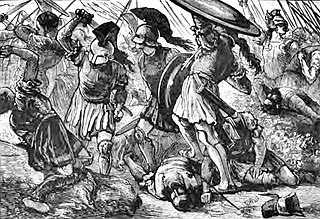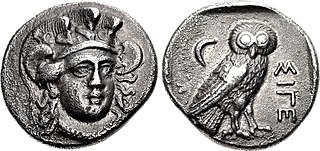Related Research Articles

Demosthenes was a Greek statesman and orator in ancient Athens. His orations constitute a significant expression of contemporary Athenian intellectual prowess and provide insight into the politics and culture of ancient Greece during the 4th century BC. Demosthenes learned rhetoric by studying the speeches of previous great orators. He delivered his first judicial speeches at the age of 20, in which he successfully argued that he should gain from his guardians what was left of his inheritance. For a time, Demosthenes made his living as a professional speechwriter (logographer) and a lawyer, writing speeches for use in private legal suits.
Year 346 BC was a year of the pre-Julian Roman calendar. At the time it was known as the Year of the Consulship of Corvus and Visolus. The denomination 346 BC for this year has been used since the early medieval period, when the Anno Domini calendar era became the prevalent method in Europe for naming years.
This article concerns the period 349 BC – 340 BC.
This article concerns the period 359 BC – 350 BC.
Eubulus was a statesman of ancient Athens, who was very influential in Athenian politics during the period 355 BC to 342 BC and was notable for his abilities in managing Athenian finances.
A philippic is a fiery, damning speech, or tirade, delivered to condemn a particular political actor. The term is most famously associated with two noted orators of the ancient world: Demosthenes of ancient Athens and Cicero of ancient Rome. The term itself is derived from Demosthenes's speeches in 351 BC denouncing the imperialist ambitions of Philip of Macedon, which later came to be known as The Philippics.

The Battle of Chaeronea was fought in 338 BC, near the city of Chaeronea in Boeotia, between Macedonia under Philip II and an alliance of city-states led by Athens and Thebes. The battle was the culmination of Philip's final campaigns in 339–338 BC and resulted in a decisive victory for the Macedonians and their allies.

Chares of Athens was a 4th-century BC Athenian military commander (Strategos), who for a number of years was one of Athens's foremost commanders. He was also a well connected politician enabling him to procure the commands he desired, commands he primarily used to enrich himself and his adherents.
The Olynthiacs were three political speeches, all delivered by the Athenian statesman and orator Demosthenes. In 349 BC, Philip II of Macedon attacked Olynthus, which at the time was an ally of Athens. In the Olynthiacs, delivered in 349 BC, Demosthenes urged Athens to help Olynthus.
The "Second Philippic" is an oration that was delivered by the Athenian statesman and orator Demosthenes between 344–343 BC. The speech constitutes the second of the four philippics the orator is said to have delivered.
Peace of Philocrates is the name given to the peace treaty concluded in 346 BC between Athens and Macedon under Philip II. Philocrates was the name of the main Athenian negotiator of the Treaty.
The "Third Philippic" was delivered by the prominent Athenian statesman and orator, Demosthenes, in 341 BC. It constitutes the third of the four philippics.
"On the Chersonese" is a political oration delivered by the Athenian statesman and orator Demosthenes in 341 BC. A short time later Demosthenes delivered one of his most famous speeches, the Third Philippic.
"On the Peace" is one of the most famous political orations of the prominent Athenian statesman and orator Demosthenes. It was delivered in 346 BC and constitutes a political intervention of Demosthenes in favor of the Peace of Philocrates.
"On the False Embassy" is the name of two famous judicial orations, both delivered in 343 BC by the prominent Athenian statesmen and fierce opponents, Demosthenes and Aeschines.
The Third Sacred War was fought between the forces of the Delphic Amphictyonic League, principally represented by Thebes, and latterly by Philip II of Macedon, and the Phocians. The war was caused by a large fine imposed in 357 BC on the Phocians by the Amphictyonic League, for the offense of cultivating sacred land; refusing to pay, the Phocians instead seized the Temple of Apollo in Delphi, and used the accumulated treasures to fund large mercenary armies. Thus, although the Phocians suffered several major defeats, they were able to continue the war for many years, until eventually all parties were nearing exhaustion. Philip II used the distraction of the other states to increase his power in northern Greece, in the process becoming ruler of Thessaly. In the end, Philip's growing power, and the exhaustion of the other states, allowed him to impose a peaceful settlement of the war, marking a major step in the rise of Macedon to pre-eminence in Ancient Greece.

Classical Greece was a period of around 200 years in Ancient Greece, marked by much of the eastern Aegean and northern regions of Greek culture gaining increased autonomy from the Persian Empire; the peak flourishing of democratic Athens; the First and Second Peloponnesian Wars; the Spartan and then Theban hegemonies; and the expansion of Macedonia under Philip II. Much of the early defining politics, artistic thought, scientific thought, theatre, literature and philosophy of Western civilization derives from this period of Greek history, which had a powerful influence on the later Roman Empire. Part of the broader era of classical antiquity, the classical Greek era ended after Philip II's unification of most of the Greek world against the common enemy of the Persian Empire, which was conquered within 13 years during the wars of Alexander the Great, Philip's son.
The Theorica, also called the Theoric Fund or Festival Fund, was the name for the fund of monies in ancient Athens expended on festivals, sacrifices, and public entertainments of various kinds. The fund was, in certain circumstances, also distributed among the people in the shape of largesses from the state.

Under the reign of Philip II, the ancient Greek kingdom of Macedonia, initially at the periphery of classical Greek affairs, came to dominate Ancient Greece in the span of just 25 years, largely thanks to the character and policies of its king. In addition to utilising effective diplomacy and marriage alliances to achieve his political aims, Philip II was responsible for reforming the ancient Macedonian army into an effective fighting force. The Macedonian phalanx became the hallmark of the Macedonian army during his reign and the subsequent Hellenistic period. His army and engineers also made extensive use of siege engines.
The Fourth Philippic is a speech attributed to the Athenian statesman and orator, Demosthenes and given in 341 BC. It constitutes the last of the four philippics. Modern scholars, however, consider that the speech is not Demosthenes' work and may be attributed to Anaximenes of Lampsacus who frequently wrote imagined dialogues or speeches for real figures. If it was a genuine Demosthenic speech, it is likely that it was issued in pamphlet form rather than actually delivered as a speech.
References
- ↑ "Definition of PHILIPPIC". www.merriam-webster.com. Retrieved 2023-02-08.
- ↑ Pearson, Lionel (1964). "The Development of Demosthenes as a Political Orator". Phoenix. 18 (2): 95. doi:10.2307/1085912. ISSN 0031-8299.
- 1 2 Adams, Charles Darwin (1912). "Are the Political "Speeches" of Demosthenes to Be Regarded as Political Pamphlets?". Transactions and Proceedings of the American Philological Association. 43: 5. doi:10.2307/282747. ISSN 0065-9711.
- ↑ Demosthenes, Against Aristocrates, 121.
- ↑ Demosthenes, For the Liberty of the Rhodians, 24.
- ↑ Demosthenes, On the False Embassy, 319.
- 1 2 3 Demosthenes (Feb 14, 2023). "First Philippic" (PDF). TaleBooks.
- 1 2 Demosthenes (Feb 14, 2023). "First Philippic" (PDF). TaleBooks.
- ↑ J. De Romilly, A Short History of Greek Literature, 116-117.
- ↑ The Helios.